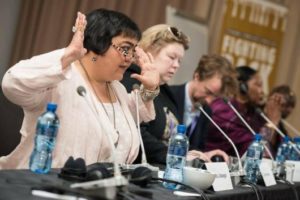Books and all forms of writing are terror to those who wish to suppress the truth – Wole Soyinko
The 39th Congress of International Federation for Human Rights (FIDH) elected Guissou Jahangiri as one of the new vice-presidents of the FIDH.
The Iranian-born human rights defender Jahangiri is a founding member and executive director of OPEN ASIA/Armanshahr, a human rights organisation with activities in Afghanistan, Tajikistan and advocacy actions in regard to Iran; an organisation that will turn 20 in December 2016.
Brief biographical note
Jahangiri moved to Paris at the age of 16 and studied international relations and political sociology specialising in war, women’s rights and post-Soviet Muslim republics at the American University and Ecole des Hautes etudes en sciences sociales (The School for Advanced Studies in the Social Sciences) (DEA doctoral degree/ strategic studies).
While a teenager, she defended the rights of asylum seekers, migrants and women. She also worked 15 years as a journalist for Courrier International covering Iran, Afghanistan & Central Asia.
Jahangiri came in contact with FIDH over 20 years ago, when she solicited advice to defend the rights of her Iranian compatriots and Iranian/Kurdish refugees. Having spent 5 years in war-torn Tajikistan as HRW researcher and acting head of the UN Office for Co-ordination of Humanitarian Affairs, she co-initiated a national survey on violence against women in the greater region leading to new laws and adoption by WHO Europe of its methodology.
Following her term in Tajikistan, she went back to FIDH to report and ask for help and, after founding Armanshahr, benefited from FIDH’s strategic support in breaking the silence on the war-torn Afghanistan.
Her work in Afghanistan focuses on defending victims, Transitional Justice and women’s rights, and advocacy campaigns. In 2006, she founded a unique human rights publishing house that has turned out and distributed 200,000 copies of books in Afghanistan and the rest of the region. Jahangiri launched the International Simorgh Peace Prize in 2009 with the aim of appreciating activities of outstanding human rights and civic cultural activists in the Heart of Asia. In 2013, she co-founded with Roya Film House the first ever Women’s International Film Festival (WIFF) in Afghanistan as a regional and international platform.
A selection of views and ideas
Jahangiri made a passionate speech to the FIDH Congress, which she began by quoting the great Nigerian literature Nobel laureate Wole Soyinko: «Books and all forms of writing are terror to those who wish to suppress the truth».
Excerpts of Jahangiri’s speech:
“I bow to and cherish the memory of the great spirits and the audacity of the founding fathers and mothers of the movement for the defence of human rights in France and the unique FIDH, the brave and the just people from whom we have inherited this precious space.
“There is no frontier for a human rights defender. I believed this when my parents told me ‘the world is our village. Think globally and act locally.’ That is what I have done relentlessly, in France with homeless Syrian families in the outskirts of Paris, in the heart of Asia where I have accompanied victims of war in Afghanistan, and in the case of Iran when I have given a voice to the struggle of the repressed women.
“Two days ago, as I was listening to the speech of now FIDH Honorary President, my compatriot Karim Lahidji, I received a shocking tweet from my young Afghan friend, the Pulitzer winning photographer Massoud, from a classroom in the American University of Kabul that the Taliban had attacked. He said: This could be the last time you hear from me”. He survived with injuries, but his comrade sitting across from him was killed.
“If I were to read you today’s headlines on Afghanistan on the BBC website, this is what you would hear: 13 killed and 7 injured in the University attack; Unknown men behead a girl in western Afghanistan; MP survives from assassination attempt; Explosion in the North: at least 5 dead and scores injured.
“Yes there is no frontier for us defenders. And I really miss my friend Nabeel Rajab, the Bahraini human rights defender. He must be released.
“For me, there are always at least two recurring themes to be addressed and enhanced:
“First: If Transitional Justice and the rights of the victims are at the heart of our actions in Afghanistan, then the precious experience and collaboration between Asian, Latin American and African countries is very valuable to us. We must support and work with each other.
“Second: There is a need to explore, renew and further expand forms, platforms and channels of communication and alternative visibility in order to better amplify the voices at the local level in our fight against new forms of power and resistance to the shrinking space.
“To give an example: we founded the WIFF in the ancient city of Herat in Western Afghanistan which has no cinema, and received hundreds of films from closed countries such as Iran, China, Vietnam, as well as Korea, Russia, Palestine, Spain, India, Canada, France, USA, to name but a few. This event not only enabled us to involve human rights defenders, local institutions, but put at the forefront women’s rights-related issues regionally.
“Afghanistan is considered as the worst place on earth to be a woman. We can cooperate further in our work on women’s rights in a setting where safeguarding rights is a challenge in many geographies against a backdrop of growing barbaric fundamentalisms.”
Jahangiri concluded by quoting Rumi, the renowned 13th century Persian poet born in what is now Northern Afghanistan: “Dance, when you’re broken. Dance, if you’ve torn the bandage off. Dance in the middle of the fighting. Dance in your blood. Dance when you’re perfectly free.”


